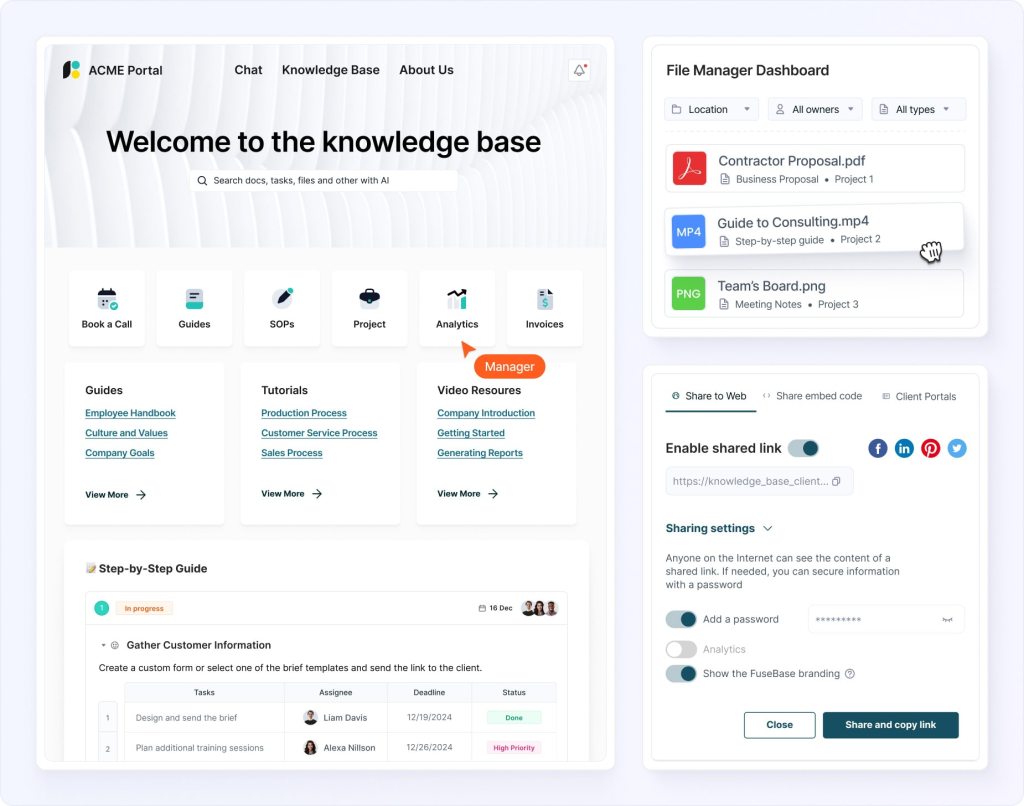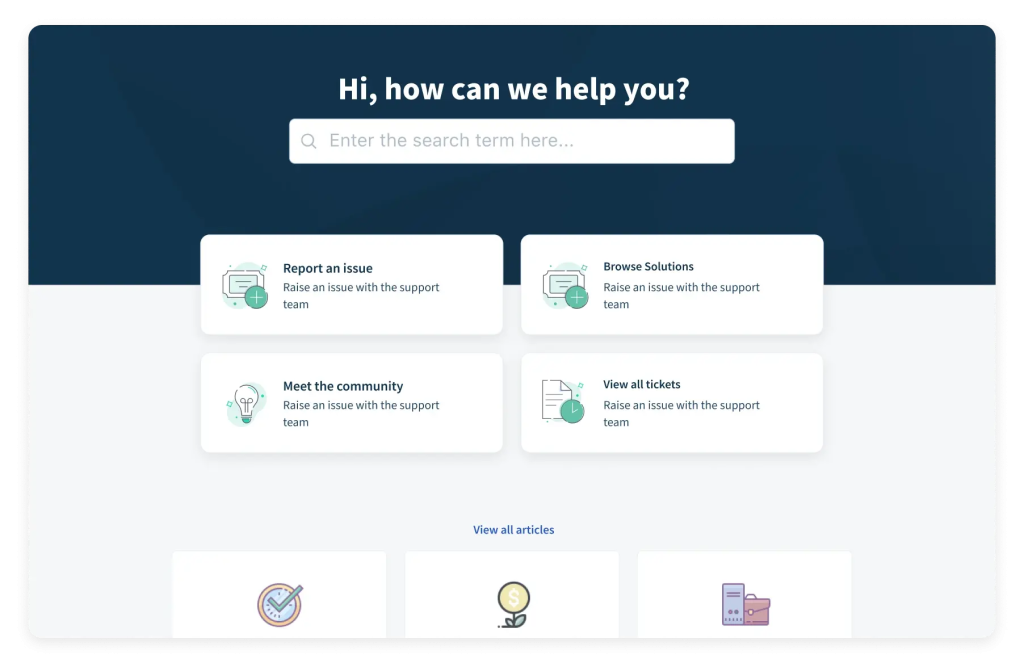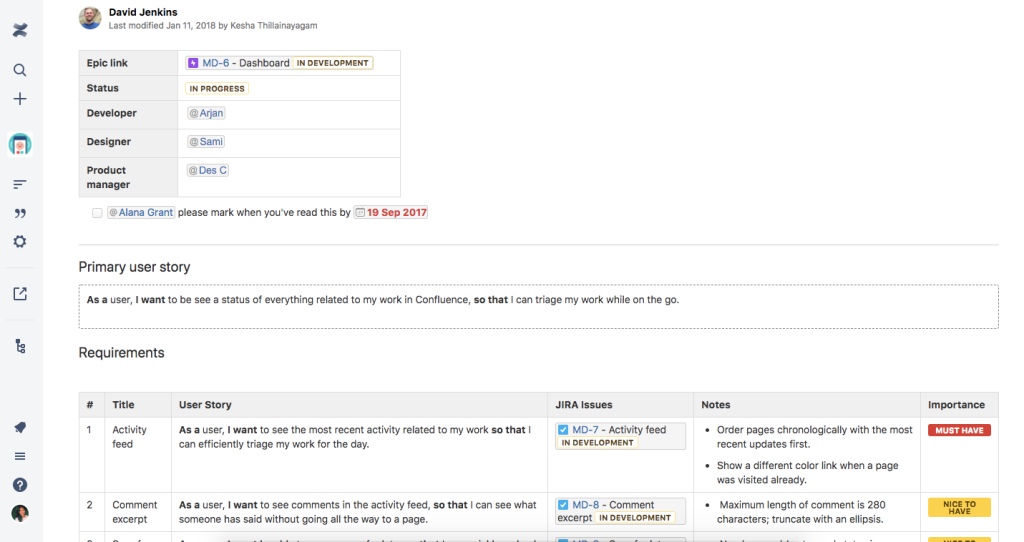
Knowledge base software is a repository that stores information for easy access and management. It serves as a centralized platform where both internal and external knowledge can be organized and shared. By understanding the various types of knowledge bases and implementing best practices, companies can significantly improve their customer experience and internal operations.
TL;DR – Overview of Best Knowledge Base Software
1. FuseBase – Best for comprehensive, scalable knowledge management
Supports internal, partner, and client knowledge bases with infinite scaling, strong integrations, and automation for organized knowledge sharing.
2. Freshdesk – Best for integrating customer support with self-service
Combines ticket management, automation, and knowledge base tools for efficient inquiry handling.
3. Confluence – Best for collaborative internal documentation
Centralized space for creating, sharing, and managing team projects and documents.
4. Helpjuice – Best for analytics-driven knowledge optimization
Offers advanced analytics to track and improve how users engage with knowledge base content.
5. Document360 – Best for intuitive, easy-to-use knowledge bases
User-friendly interface that simplifies onboarding, contribution, and navigation.
6. Bloomfire – Best for community-focused knowledge sharing
Encourages collaboration and interaction to foster a culture of continuous learning.
What is Knowledge Base Software?
The primary purpose of knowledge base software is to facilitate knowledge management by providing a structured way to store and retrieve information. Businesses can create a self-service platform where users can find relevant information without needing direct assistance from support teams. This not only enhances the customer experience but also empowers employees during onboarding and ongoing training.
The types of knowledge bases can vary widely, including internal knowledge bases tailored for employee onboarding and external knowledge bases crafted for customer service. An effective knowledge base helps organizations streamline workflows, reduce redundancies, and enhance communication across departments. By utilizing artificial intelligence, businesses can improve query handling and provide users with accurate, up-to-date information, making it easier for support teams to troubleshoot issues and find answers.
Here is a list highlighting the benefits and features of an effective knowledge base for organizations:
- Streamline Workflows: An effective knowledge base helps organizations streamline workflows and reduce redundancies.
- Enhance Communication: It enhances communication across departments by providing accurate, up-to-date information.
- Improve Query Handling: Utilizing artificial intelligence helps businesses improve query handling.
- Support Teams: Makes it easier for support teams to troubleshoot issues and find answers.
- Track Analytics: Knowledge base software helps organizations track analytics to evaluate frequently accessed articles or resources.
- Foster Knowledge Sharing: Encourages a culture of knowledge sharing and continuous improvement.
- Support Strategic Goals: Helps businesses support their strategic goals and enhances overall performance.
- Improve Customer Service: Significantly improves the customer service knowledge base, providing a valuable resource for clients seeking assistance.
What Types of Knowledge Bases are Available?
When considering knowledge base software, many businesses have common questions regarding its implementation and usage. One frequently asked question is, “What types of knowledge bases are available?” Companies can choose from various types, including internal knowledge bases for employee training and external knowledge bases aimed at customer support. Another common query revolves around the effectiveness of AI in knowledge management. Many organizations benefit from AI-powered tools that can streamline the process of updating content and provide users with quick access to relevant information.
Top 6 Knowledge Base Software Solutions
Setting up a knowledge base can be a seamless process if approached with a clear strategy. Start by defining the type of knowledge you want to include, whether it is internal knowledge for employees or external knowledge for customers. Gather existing documentation, FAQs, and relevant information that can be structured into a coherent format. Utilizing knowledge-based systems, you can categorize content effectively, making it easier for users to navigate. Implementing a user-friendly interface is crucial to ensure that both employees and customers can easily find answers to their queries.
Choosing the right knowledge base software solution is essential for maximizing efficiency. Some of the top solutions available today include FuseBase, Freshdesk, Confluence, Helpjuice, Document360, and Bloomfire. Each of these platforms offers unique features tailored to different business needs.
FuseBase
Best for: Organizations looking for a comprehensive and integrated knowledge management solution.

FuseBase is a versatile knowledge base software designed to streamline information management within organizations, partners and clients. It offers robust features that facilitate easy content creation, organization, and retrieval, making it an ideal choice for businesses aiming to enhance their knowledge sharing and collaboration efforts.
FuseBase stands out with its ability to scale infinitely, making it an ideal choice for organizations with growing data and user needs. It offers the flexibility to create dedicated client portals, partner spaces, and an internal document library all within one tool. Additionally, FuseBase supports a large number of third-party integrations and automations, enhancing its functionality and adaptability. For future scaling, the platform’s success lies in leveraging its infinite scaling capabilities to accommodate growth.
Freshdesk
Best for: Businesses needing seamless integration between support teams and customer inquiries.

Freshdesk is a customer support platform that includes a powerful knowledge base feature. It is designed to help support teams manage customer inquiries efficiently, offering tools for ticket management, automation, and customer self-service. Its robust ticket management tools and customer self-service options empower support teams to manage inquiries efficiently. It’s crucial to monitor system performance to ensure it can handle increased ticket volumes without lag, avoiding potential drawbacks.
Confluence
Best for: Teams looking for a collaborative space for internal knowledge sharing.

Confluence by Atlassian is a collaboration tool that allows teams to create, share, and collaborate on projects and documents in a centralized space. It is particularly effective for internal knowledge sharing and documentation.
Confluence is a powerful tool for teams seeking a collaborative space for project and document management. It centralizes internal knowledge sharing, making it effective for documenting and sharing information within teams.
For future growth, expanding integrations with other Atlassian products can enhance project management capabilities. However, it’s important to address any potential user interface complexity as more features are added to maintain ease of use.
Helpjuice
Best for: Companies needing advanced analytics to track user interactions with their knowledge base.

Helpjuice is a knowledge base software that offers powerful analytics tools. It helps organizations understand how users interact with their content, enabling continuous improvement and refinement of the knowledge base. However, it’s important to ensure that analytics tools remain easy to use and interpret as data volume grows.
Helpjuice offers advanced analytics tools that provide insights into user interactions with the knowledge base. This allows organizations to continuously improve and refine their content.
Document360
Best for: Teams seeking an intuitive interface for easy onboarding and information access.

Document360 is a user-friendly knowledge base software that simplifies the process of onboarding and accessing information. Its intuitive interface makes it easy for teams to contribute and find the information they need.
Document360 is known for its intuitive interface, which simplifies onboarding and information access. It facilitates easy contribution and retrieval of information by team members and organizes content in a structured manner for easy navigation.
As the platform scales, maintaining the simplicity of the interface while adding advanced features is key to success. Avoiding over-complicating the user experience is crucial as new functionalities are introduced.
Bloomfire
Best for: Organizations aiming to foster a vibrant community around knowledge sharing.

Bloomfire is a knowledge management platform that emphasizes community engagement. It encourages employees to share and interact with knowledge, promoting a culture of collaboration and continuous learning.
Bloomfire emphasizes community engagement, fostering a vibrant environment around knowledge sharing. It encourages interaction and collaboration among employees, promoting a culture of continuous learning and knowledge exchange. It’s essential to ensure that the platform remains scalable and responsive as community interactions increase, preventing potential drawbacks.
Summary
In summary, selecting the right knowledge base software is crucial for any organization aiming to enhance its knowledge management processes. Such platforms like FuseBase provide infinite scalability, making them ideal for organizations experiencing growth. They support the creation of client portals, partner spaces, and internal document libraries, while also offering numerous third-party integrations and automations to enhance functionality and adaptability.
Ultimately, the effectiveness of your knowledge base software hinges on its ability to adapt and grow with your organization’s needs. By adopting best practices such as regular updates and leveraging AI capabilities, companies can create an effective knowledge base that serves both employees and customers alike.
